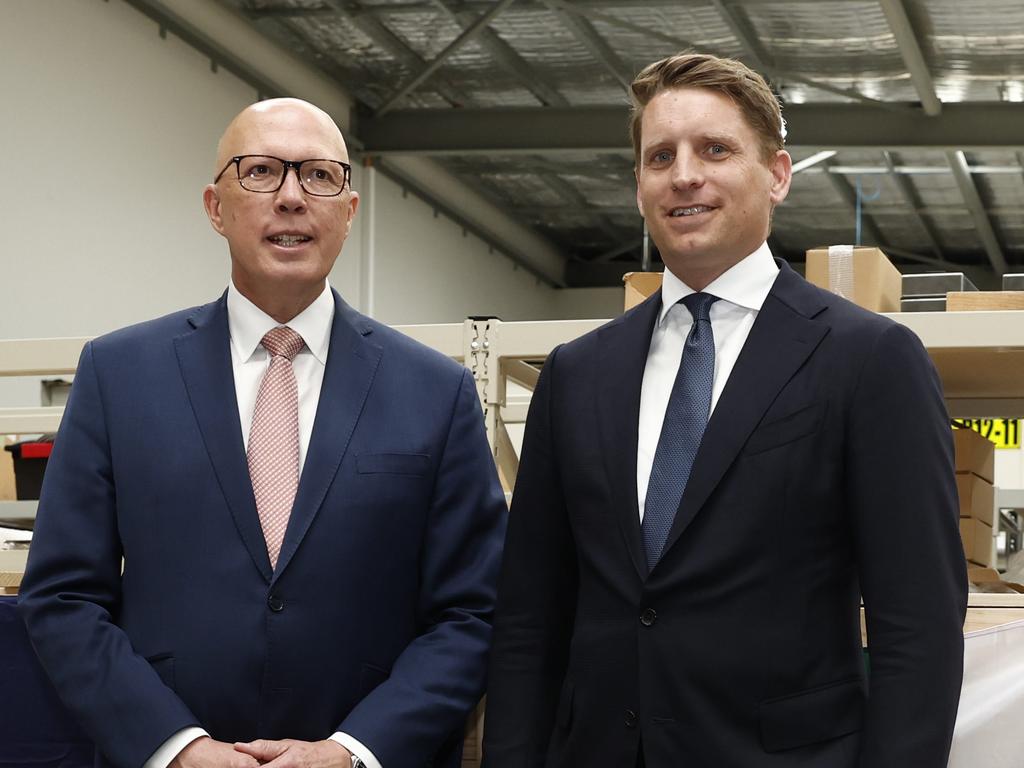Peter Dutton fires a late salvo and declares war on defence drift
The Opposition Leader’s plan to boost spending brings some welcome substance to the campaign at last.
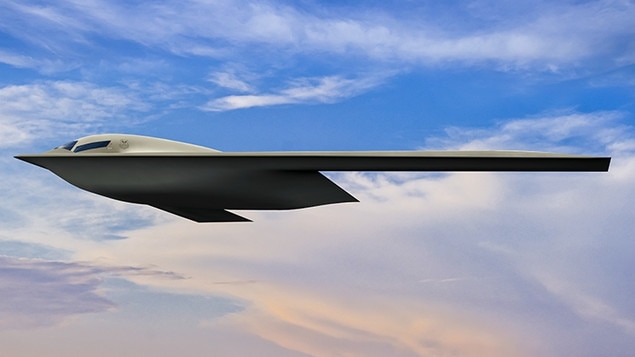
At last we have a measurable and important policy difference between Labor and the Coalition with Peter Dutton’s plan to lift defence spending to 2.5 per cent of GDP across five years and to 3 per cent by 2035.
Labor’s plan is to lift defence spending slowly to 2.4 per cent by 2034. The difference amounts to an extra $21bn across the first five years and much more after that.
Defence spending now is just under $59bn. An additional spend of something over $4bn a year provides modest room to expand military capabilities. Moving to 3 per cent in the second half of the decade really does create space for making the Australian Defence Force a more lethal deterrent.
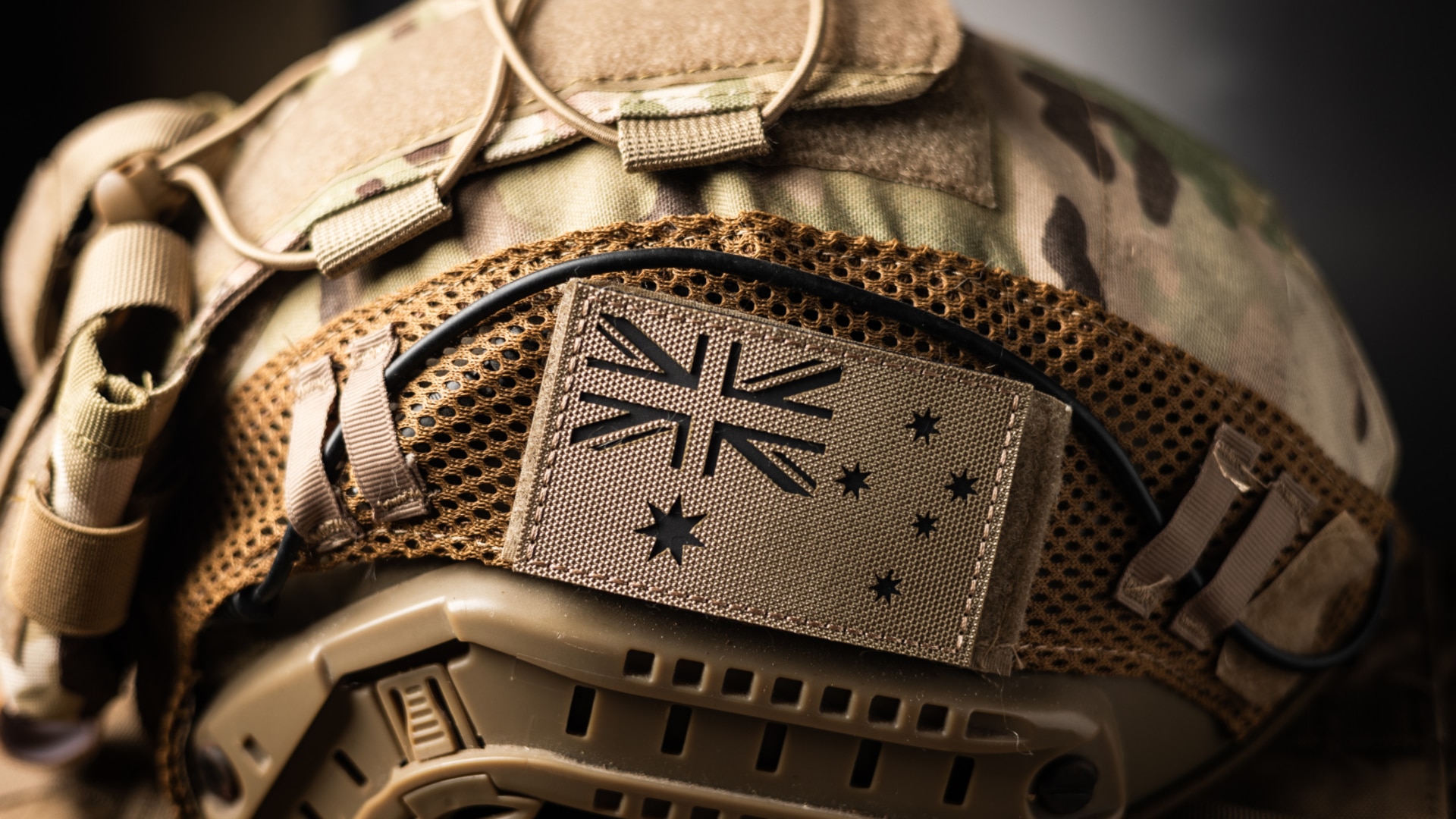
Like most commentators I am puzzled about why the Coalition delayed this announcement to a point in the election campaign when already more than a half-million people have voted.
Dutton claims this allowed time to assess the country’s financial situation after the March budget. Well, maybe, but the delay in announcing a big policy in an area of natural strength to the Coalition leaves people with little time to consider what’s on offer.
Labor’s response was to ask where the money was coming from – ironic given the government’s campaign around “free GP visits”, “free healthcare with their Medicare card”, “free TAFE” and the rest.
On Thursday, ALP president Wayne Swan offered the judgment on Dutton’s defence announcement that “We don’t think that amount of spending is needed”, putting him at odds with Labor Party former leader and defence minister Kim Beazley and most thinking observers of Australia’s strategic outlook.
Is Swan serious? An ADF in sharp decline suffering a morale crisis, China and Russia expanding their power in the region, and Donald Trump pushing allies to lift their game, and Swan sees nothing to worry about?
Then again, Swan as federal treasurer was responsible in 2012 for driving the defence budget down to its lowest GDP level since the 1930s.
Labor’s damaging disregard for defence should be a central issue in this election, but the Coalition must take responsibility for not making defence a priority. This is what happens when tactical campaigning trumps policy strategy in oppositions.
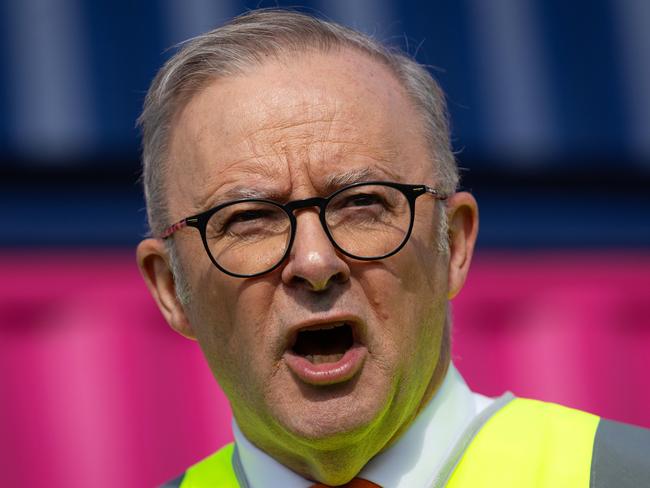
All governments have to juggle different spending decisions. What is clear is that defence has not been a priority for the Albanese government.
Defence Minister Richard Marles claims his government has made the “single biggest peacetime increase in Australia’s defence budget since the end of the second world war”. The triumphalism is astonishing. The reality is that spending has lifted only fractionally – $770m – above what was planned in the Coalition’s 2016 defence white paper, now nine years old.
In fact, on Labor’s figures, inflation is significantly reducing what the defence budget can buy.
The budget papers show Labor’s promised spending growth begins to look significant only in the 2027-28 financial year, two elections from now.
Marles had hoped to do better. He began by asking former defence minister Stephen Smith and former defence force chief Angus Houston to do a root-and-branch review of defence posture. Their report has never been published. Instead, we got a massaged Defence Department version of it that hid many identified problems and the recommended solutions.
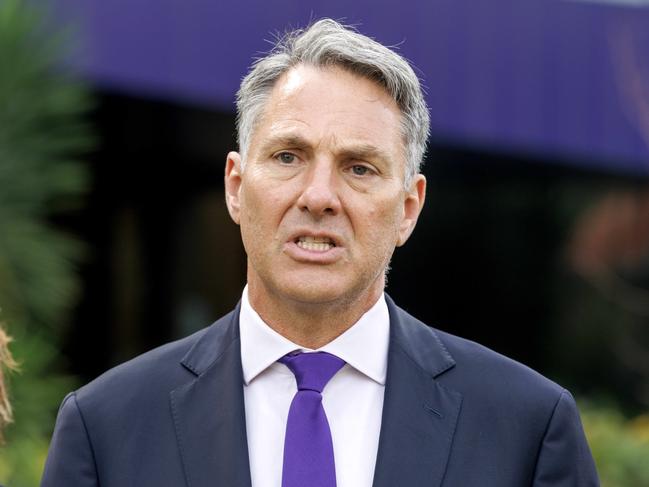
In 2024 Marles offered a national defence strategy. The promise was that this would be a “whole of government” strategy that would energise the public and private sector to make Australia more resilient and the ADF stronger.
None of that survived the Albanese national security committee. What we got instead was a dispiriting exercise built on the idea of “minimal viable capability” in the ADF and a series of “tough but necessary decisions to cancel, divest, delay or re-scope projects”.
When government regularly said Australia was facing the most difficult strategic outlook since World War II, Marles was forced into making $80bn in equipment cuts, deferments and “closed” projects. This included retiring HMAS Anzac and not proceeding with frigate upgrades; “deferring” the planned acquisition of a fourth squadron of F-35 aircraft; retiring minehunting ships; drastically cutting numbers of army vehicles; not proceeding with buying two support ships; and, inexplicably, abandoning air and missile defence projects.
Across the ADF it is clear a serious squeeze has been put on support and maintenance spending. The result is that operational readiness has fallen through the floor. My view is that Defence would not be able to mount and sustain a large-scale stabilisation operation in 2025 as we did in East Timor two decades ago.
I have been working with and around ADF and Defence Department people for almost 40 years. I have never seen them more downhearted, directionless and dispirited.
It astonishes me that we have come to this nadir when 15 years ago the ADF was at the top of its game, having conducted professional and highly competent operations in East Timor, Iraq, Afghanistan, Solomon Islands and on many other missions.
We should not be surprised that the government’s cuts have led to what Defence describes as a “workforce crisis”. No one in the ADF is persuaded by Marles’s platitudes “that we must recognise that people are Defence’s most important capability”.
Not all of this is the Albanese government’s fault but I can assure you the troops know when a prime minister has their back, and they don’t think they are being supported today.
The problem is that governments across several decades simply failed to properly fund defence, which has been at or below 2 per cent of GDP for decades.
In 2012-13, under the Gillard government, defence spending fell to 1.62 per cent of GDP – the lowest it had been since the late 1930s. We haven’t seen spending significantly over 2 per cent since the Cold War.
After Scott Morrison announced the AUKUS arrangement in September 2021, I understood it was his intention to lift defence spending to cover the costs of the nuclear-powered submarines. But that didn’t happen.
Marles tries but failed to get the Albanese government to lift spending. So, we are here because of a bipartisan failure to take defence seriously. It is to the credit of Dutton and Coalition defence spokesman Andrew Hastie that they plan to remedy that failure. I would have preferred to see that 3 per cent figure hit in the next term of government but an ambitious attempt is being made.
Dutton’s media statement does not identify military capabilities. The Coalition has committed to the early addition of a fourth squadron of F-35s. Beyond that Dutton has noted correctly that drones, guided weapons, munitions and expanding Australian defence industry need to be top of the list.
The most urgent priority needs to go to boosting the deterrent capability of the ADF. Given our geography, that means weapons with range and in sufficient numbers to give China, and we must now add Russia, sufficient pause in their military adventurism.
For Dutton the key message should be that we are not preparing for war; rather, a stronger ADF working closely with allies such as the US and Japan is the only sure way to keep the peace.
One way to strengthen deterrence would be to acquire the new B-21 long-range bomber, now in production and soon to be in US service. We will need to be in 3 per cent defence spending territory for that to be realistic.
An incidental benefit is that a B-21 purchase will resonate with Trump. The alliance relationship can’t be ignored forever. Getting a stronger ADF is important for our own security but it will also help in relations with the White House.
China can be deterred. Xi Jinping is an ambitious opportunist. The Albanese government clearly has shown that offering weak responses in the face of People’s Liberation Army attacks on our ships and aircraft leads only to more contemptuous displays of Beijing’s gunboat diplomacy.
That’s a complicated message to get right and there is little time to sell it, but Australians are justified to be worried about the threatening behaviour of China and Russia. Hopefully they will see this policy as a shift to a strategy of peace through strength, rather than the Albanese approach of appeasing Beijing.
In working out what to spend, Dutton should eliminate the brittleness of the current force. That will go a long way to address unhappiness in the ADF because it focuses on the equipment it has, not the fantasy ADF of the 2040s championed by the government.

Dutton should try to surface the innovative capabilities of Australian industry, learn some lessons from the adaptive and agile Ukrainians and Israelis, and above all don’t let the Defence Department suffocate everything with its glacial processes.
Left to its own devices, Defence does things like ponderously develop “a 10-year vision for an integrated, secure approach to innovation”. The war (cold or hot) will be long over by the time that “vision” produces anything useful.
While most of the media focused on Dutton’s spending announcement, he also foreshadowed developing a national security strategy “to bring together all arms of our national security architecture under a single unified vision”.
I’m delighted that Dutton and his home affairs spokesman, James Paterson, acknowledged efforts by the much missed Jim Molan to promote a national security approach.
Labor has failed utterly on this. There is not even the faintest appearance of co-ordination between defence, national and internal security. Take, for example, the arrival of 3000 Gazans out of a war zone with inadequate security checks, or the constant Chinese cyber attacks on government and individuals, or the links between terrorism and organised crime, or growing state-sponsored foreign interference.
Hopefully, a Coalition national security strategy would achieve what Marles announced he wanted to do with his national defence statement but failed to deliver because of the uninterest of his ministerial colleagues.
We are enduring a policy-lite election campaign but Dutton’s defence spending announcement offers some substance and a way to address the security fears increasingly worrying Australians.
Peter Jennings is is director of Strategic Analysis Australia and was executive director of the Australian Strategic Policy Institute from 2012 to 2022. He is a former deputy secretary for strategy in the Defence Department (2009-12).


